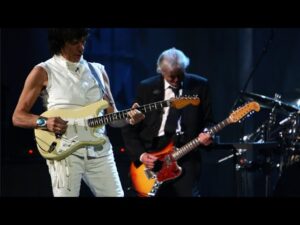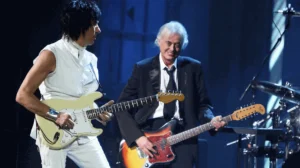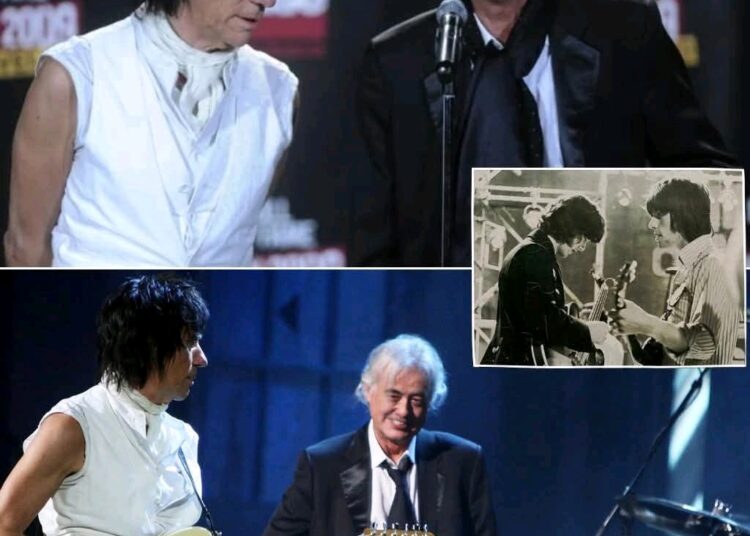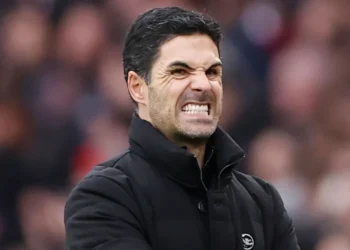When Titans Roared: Jeff Beck & Jimmy Page’s Hall-of-Fame Firestorm
Seven gleaming Les Pauls lined the wings like knights on parade, but only two mattered when Jeff Beck and Jimmy Page strode onto the Rock and Roll Hall of Fame stage. In an evening meant to honor legacies, the pair turned laurels into fuel, detonating a 15-minute clinic that reminded everyone why the electric guitar became rock’s baton of rebellion.
The moment their silhouettes appeared in the spotlights, a low rumble rolled through the auditorium—part anticipation, part disbelief that these famously independent spirits had agreed to share six strings again. Though bound by early Yardbirds DNA, their careers diverged so sharply that fans often debated who wore the sharper halo. Yet here they were, shoulder to shoulder, trading sly smirks like conspirators about to rob the vault of rock history.
Beck began alone, fingers dancing through the haunting harmonics of “Beck’s Bolero.” That 1966 instrumental has always felt like a coded letter to the future, but tonight it sounded downright prophetic. His Stratocaster phrased like a human voice—crying, then whispering, then flat-out growling—as if feeding off the hush in the room. Beck’s right-hand wizardry coaxed sitar-like drones and violin swoops without a pedal in sight; every bend was a syllable, every slide a conjurer’s flourish. Musicians in the crowd leaned forward, mouths ajar, spouses nudging them to remember to breathe.

At the four-minute mark a shadow moved beside him. Page, clad in black velvet, slung his sunburst Les Paul low, struck an open E chord, and the hall seemed to expand. The transition was seamless yet seismic: Beck’s celestial reverie resolved into a bed for Page’s “Immigrant Song,” and the crowd erupted as that Norse-war-cry riff sailed out like a Viking longship. No vocals were needed; the melody alone summoned memories of Valhalla visions and midnight drives with the radio too loud. Page attacked the riff with staccato precision, then swerved into slide runs that tugged blues into outer space, a reminder that he’s equal parts architect and arsonist.
For a brief, beautiful stretch, the two traded four-bar volleys—Beck answering Page’s martial stabs with elastic dives, Page countering Beck’s jazz-tinged flurries with raw, percussive chugs. It was less duel than dialect: two dialects of the same mother tongue, electricity. You could almost chart their philosophies in real time—Beck shaping air like a sculptor, Page painting broad, mystical strokes—and the synthesis felt both impossible and inevitable.
Then, without warning, Beck hammered the descending intro to “Train Kept A-Rollin’,” that R&B locomotive both men once powered in the Yardbirds. Drummer Cindy Blackman Santana kicked the engine, bassist Tal Wilkenfeld locked in, and suddenly the stage became a 1965 London club transported to 2025. Beck and Page stood center-stage, backs slightly arched, necks angled toward each other like two cobras ready to strike the same prey. They traded the song’s signature call-and-response licks, grinning as each pushed the tempo a hair faster. Beck unleashed a run that seemed to somersault down the fretboard; Page answered with pinch harmonics that squealed like brakes on hot rails. When they hit the final turnaround, both players slid up to a unison high E, held it just long enough for hearts to stop, and then punctuated the air with matching downstrokes—a full-stop exclamation.
Silence followed, broken by a roar so intense the hall’s chandeliers trembled. The cameras panned wide, capturing a sea of hands flung skyward. Onstage, Beck and Page clasped each other’s forearms as if closing a deal with destiny. No grand speeches followed; none were required. Their guitars had already spoken volumes about friendship, rivalry, and the shared language of bent steel and wattage.

In interviews, Beck once quipped that his goal was to make the guitar “not sound like a guitar.” Page, conversely, sought the instrument’s darkest corners, wielding feedback and exotic tunings to pry open doors of perception. Tonight those missions converged, proving that innovation is less about lone genius than about daring conversations in the moment. For younger players in the audience—cell-phone cameras aloft, pupils dilated—this was a living encyclopedia entry: tone is touch, attitude is arrangement, and chemistry trumps perfection.
As the house lights rose, social feeds detonated with the speed of myth. “Now Trending: Beck x Page” headlined across continents, clips ricocheting from Lagos to London to Los Angeles. Many viewers fixated on virtuosity; others sensed something subtler—a reconciliation of past and present, a reminder that icons aren’t museum pieces but ongoing verbs. For fifteen blistering minutes, rock’s compass pointed true north again, guided by two masters who still view the fretboard as unexplored territory.
Some performances entertain; a rare few recalibrate the craft. Jeff Beck and Jimmy Page just redrew the map, proving that thunder still lives in wood and wire when wielded by hands brave enough to chase the storm.













